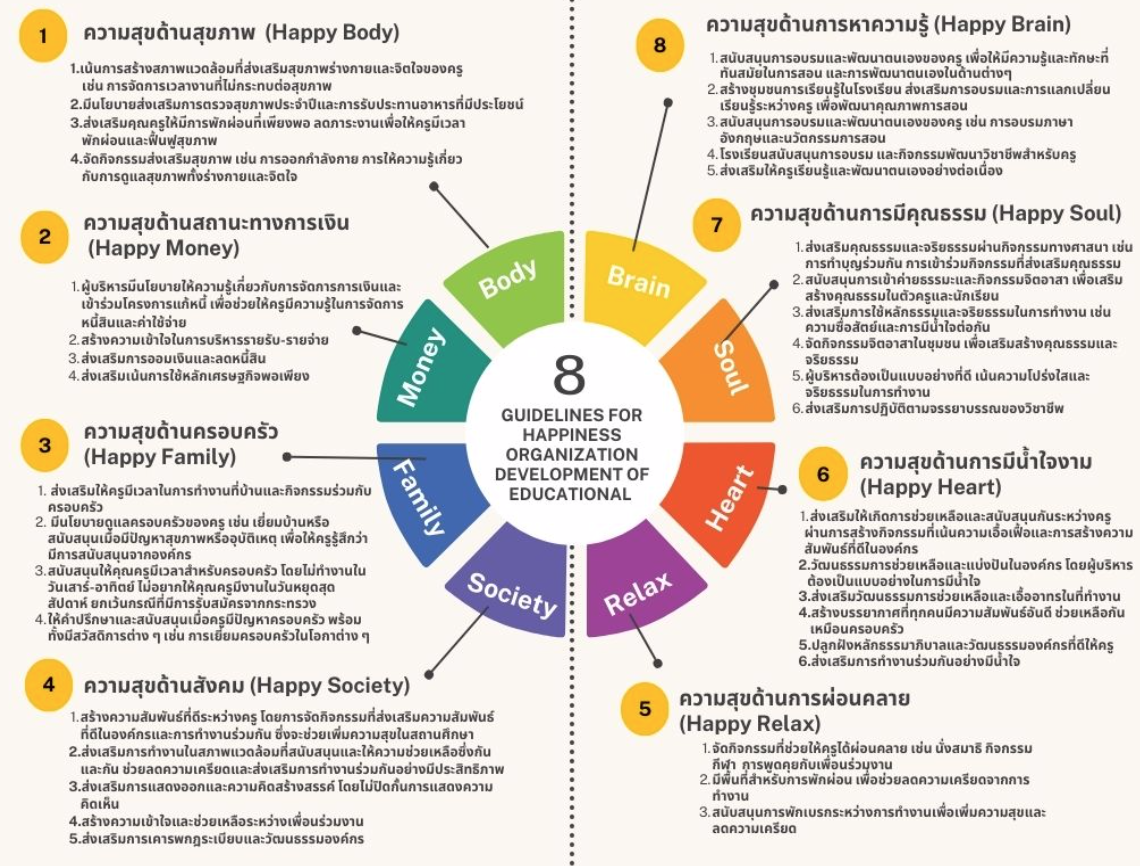Guidelines for Happiness Organization Development of Educational Administrators Under the Bangkok Secondary Educational Service Area Office 2
Main Article Content
Abstract
This study aims to examine the needs of happiness organizations in educational institutions, and to propose guidelines for developing happiness organizations in educational institutions. Under the Bangkok Secondary Educational Service Area Office 2. The research was conducted using a mixed methods approach, which is divided into two phases: Phase 1: Analyzing the needs of happiness organizations in educational institutions using quantitative research methods. The research sample consisted of 357 teachers, selected through stratified random sampling and simple random sampling. The data were analyzed using descriptive statistics and the PNImodified index. Phase 2: Proposing guidelines for the development of happiness organizations in educational institutions, through semi-structured interviews with 7 school administrators, based on their experiences. The content analysis method was employed for data analysis.
The research finding indicated:
- The needs of happiness organizations in educational institutions: Overall, the needswere found to be at a high level. The areas with the highest essential needs was financial status (Happy Money), followed by health (Happy Body), relaxation (Happy Relax), family (Happy Family), society (Happy Society), knowledge acquisition (Happy Brain), kindness (Happy Heart), and morality (Happy Soul).
- Guidelines for developing happiness organizations in educational institutions : The proposed development areas included: Development of health-related happiness (Happy Body), Development of financial well-being (Happy Money), Development of family happiness (Happy Family), Development of social happiness (Happy Society), Development of relaxation happiness (Happy Relax), Development of kindness (Happy Heart), Development of moral happiness (Happy Soul) and Development of knowledge-seeking happiness (Happy Brain).
Downloads
Article Details

This work is licensed under a Creative Commons Attribution-NonCommercial-NoDerivatives 4.0 International License.
แนวคิดและข้อเสนอแนะที่นำเสนอในบทความของวารสารการบริหารและความเป็นผู้นำทางการศึกษา มหาวิทยาลัยรามคำแหง เป็นแนวคิดที่มาจากผู้เขียน หากมีความผิดพลาดใด ๆ ผู้เขียนเป็นผู้รับผิดชอบแต่เพียงผู้เดียว
ทั้งนี้ บรรณาธิการ กองบรรณาธิการ และคณะกรรมการหน่วยจัดทำวารสารฯ จะไม่ก้าวก่ายความมั่นคงในหลักการตามความคิดของผู้เขียน
ดังนั้น บรรณาธิการ กองบรรณาธิการ คณะกรรมการหน่วยจัดทำวารสาร และมหาวิทยาลัย จะไม่รับผิดชอบใด ๆ จากผลที่เกิดขึ้นจากการนำเสนอแนวคิด และข้อเสนอแนะของผู้แต่งที่เผยแพร่ในวารสารฯ
References
Bangkok Secondary Educational Service Area Office 2. (2021). Basic Education Development Plan B.E. 2565 - 2567, 11-71. Bangkok: Bangkok Secondary Educational Service Area Office 2. [In Thai].
Bangkok Secondary Educational Service Area Office 2. (2024).BIG DATA System, Bangkok Secondary Educational Service Area Office 2. Bangkok Secondary Educational Service Area Office 2. [In Thai].
Cohen, L., Manion, L., and Morrison, K. (2011). Research Methods in Education (7th ed.). New York: Morrison.
Inda, S. and Amatariyakul, W. (2022). The Guidelines of Happy Workplace Development in Schools under the Office of Nongkhai Primary Education Service Area. PannaPanithan Journal, 7(1), 83-96. [In Thai].
Mahiphan, S. and Boonchan, B. (2024). Development Guidelines of Happy Organization in
School under Nakhon Ratchasima Primary Educational Service Area Office 5. Journal of Association of Professional Development of Educational Administration of Thailand (JAPDEAT), 6(4), 146-160. [In Thai].
Phatthalung, N, W. and Tongsawat, S. (2022). Happy Workplace of the Large School in the Secondary Education Area Office Songkhla Satun. The 13th Hatyai National and International Conference (pp.1763-1779). Hatyai, Hatyai University. [In Thai].
Ridmontri, P. and Silanookitj, C. (2024). Happy Workplace of Schools under the Bangkok Primary Education Service Area Office. City State Journal, 1(1), 35-46. [In Thai].
Rodbunpan, A. (2018). Happy Workplace of Anuban Kuiburi School (Wat Wang Yao). (Independent Study, Silpakorn University, Nakhon Pathom. [In Thai].
Saisombat, K. (2023). Guidelines for Educational Administration to the Organization of Happiness with Threefold Principles. Journal of Innovation Research on Education and Technology (JIRET), 1(2), 59-67. [In Thai].
Saiwaw, P. (2021). Guidelines for Promoting Happy Workplace Organization of Schools under Secondary Education Service Area Office Pathum Thani. (Master of Thesis, Rajamangala University of Technology Thanyaburi). [In Thai].
Sattasut, W. and Chalermvongsavej, W. (2023). Development Guidelines for Becoming a Happiness-oriented Organization in Large Secondary Schools under the Nonthaburi Secondary Education Service Area Office. Academic Journal of Dhammatharat, 23(3), 83-96. [In Thai].
Seligman, M. E. (2012). Positive psychology in practice. USA: John Wiley & Sons. Wattanathanarat, C., Duangkota, C. and Tikaewsri, N. (2013). Let’s Build a Happy Organization. Bangkok: Health Promotion Foundation Office, Health Promotion Organization Center. [In Thai].
Wongwanich, S. (2019). Research on Assessing Needs (4th ed.). Bangkok: Chulalongkorn University Press. [In Thai].


